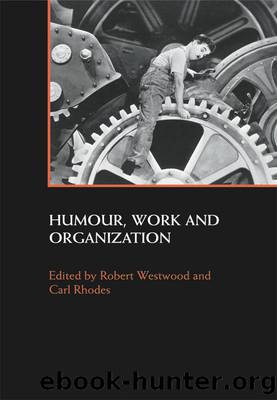Humour, Work and Organization by Robert Westwood & Carl Rhodes

Author:Robert Westwood & Carl Rhodes
Language: eng
Format: epub
Publisher: Routledge
Conclusion
One of the particular aims of this book has been to move away from a functional approach to humour in organizations. This chapter has addressed this intention by avoiding an approach which considers humour as a discourse strategy for achieving a particular goal or as a strategy to be actively adopted by employees or managers within their communication repertoire. Instead, I have focused on the distribution of humour in decisions and argued that its recurrent position, at the end of the negotiation of a decision, highlights and challenges the power asymmetries inherent in organizational talk. Humour in this structural position draws attention to the power assigned to the powerful which allows them to influence decision outcomes, and conversely the reduced power available to subordinates to effect change in this process. Many of the examples could have been analysed as humour used to establish group harmony. The very need to address the issue of group harmony, however, may result from the imbalance created by the power exercised in reaching the decision. While this power inequality is imposed by organizational accountability, the impact it has on a philosophically democratic community troubles the negotiation process. If humour is strictly unnecessary at work, its occurrence and prevalence suggests it is worthy of careful examination.
In societies where democracy is an ideal, the workplace remains a site where dominance is organizationally sanctioned but socially unappealing. Humour, as an off-record feature of discourse, allows this dominance to be acknowledged and simultaneously challenged. It may appear to be an amusing distraction and signal a group's sense of team and coherence as has been argued, but there are many other ways of analyzing its effect. While the complexity of humour has always been acknowledged, at the very least a move towards considering its multifunctionality within interaction needs to be given more priority by researchers of organizational humour.
Download
This site does not store any files on its server. We only index and link to content provided by other sites. Please contact the content providers to delete copyright contents if any and email us, we'll remove relevant links or contents immediately.
Bullshit Jobs by David Graeber(4179)
Radical Candor by Kim Scott(2710)
I Am Right, You Are Wrong by Edward De Bono(2438)
23:27 by H. L. Roberts(2245)
Nomadland by Jessica Bruder(2058)
Average Is Over by Tyler Cowen(1844)
The Conflict Resolution Phrase Book by Barbara Mitchell & Cornelia Gamlem(1772)
Out of Our Minds: Learning to Be Creative by Ken Robinson(1740)
High-Impact Interview Questions by Victoria A. Hoevemeyer(1691)
The Ideal Team Player by Patrick M. Lencioni(1640)
An Everyone Culture: Becoming a Deliberately Developmental Organization by Robert Kegan & Lisa Laskow Lahey(1631)
Who Moved My Cheese?: An Amazing Way to Deal With Change in Your Work and in Your Life by Johnson Spencer(1628)
The Asshole Survival Guide by Robert I. Sutton(1598)
Automatic Society by Bernard Stiegler(1547)
Unleashed by Anne Morriss & Frances Frei(1538)
Who by Street Randy & Smart Geoff(1501)
42 Rules of Employee Engagement by Susan Stamm(1463)
96 Great Interview Questions to Ask Before You Hire by Paul Falcone(1450)
Fish! by Stephen C. Lundin(1398)
